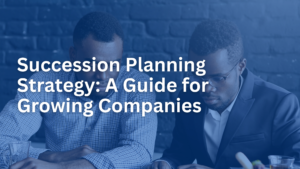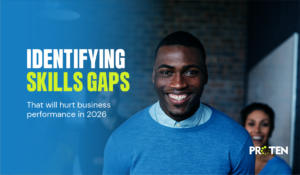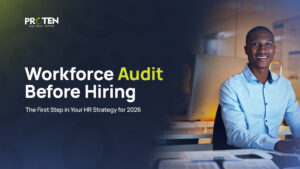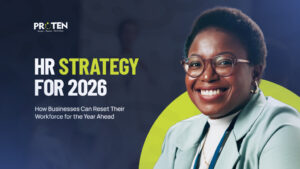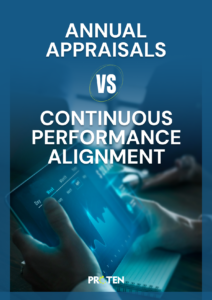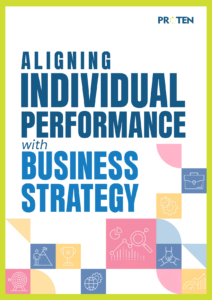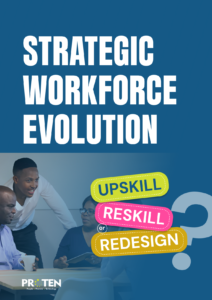Navigating the dynamic world of HR, particularly within the ever-evolving tech space, requires a keen eye for talent and a passion for building strong teams. In this edition of “My Career Chronicles,” we delve into the journey of Emmanuel Oguike, an HRBP and talent acquisition & tech recruiter who honed his skills within the healthcare industry. From his initial steps in the field to his current expertise, Emmanuel’s story offers valuable insights for anyone seeking to forge a successful path in talent acquisition, particularly within the exciting realm of tech recruitment.
About Emmanuel Oguike.
Emmanuel is a strategic HR professional passionate about shaping organizational culture for workforce productivity. He has over 5 years of experience spanning QSR, banking, human capital consulting, transport & logistics, FMCG, manufacturing, and health care, with core expertise in talent acquisition, tech recruitment, learning and development, performance management, employee relations and engagement, compensation and benefits, and organization design.
He is a talent acquisition partner who connects great talents to organizations and helps drive individual and organizational goals to equilibrium. He has proffered people-centric solutions to leading organizations across diverse sectors and industries. As a talent manager, he fosters employee attraction, retention, and development through employee engagement initiatives and effective employee value propositions.
What inspired you to pursue a career in your niche?
Helping people inspired me to pursue a career in HR. I play a crucial role in employee well-being and development as an HR professional. I create positive work environments, manage conflict, and ensure employees feel valued and supported. This focus on people and their success is very motivating.
What key milestones have shaped your career journey so far?
From my early career days:
- Earning HR Certification: This demonstrates foundational knowledge and commitment to the profession.
- Leading a Successful Recruitment Project: Filling a critical role or exceeding hiring goals is a confidence booster, and it showcased my talent acquisition skills.
- Implementing a New HR Policy or Program: Successfully launching an initiative that improves employee relations, engagement, or efficiency is a significant accomplishment.
To the mid-career days that I’m currently on:
- Taking on a Leadership Role: Mentoring junior HR professionals, leading a team project, or managing a specific HR function demonstrates my leadership capabilities.
- Successfully Navigating a Difficult Situation: Effectively resolving a complex employee relations issue, like a discrimination complaint, has showcased my problem-solving and conflict-management skills.
- Earning Recognition for my Work: Receiving an award or being recognized by colleagues or management for my contributions validates my hard work and expertise.
Can you describe a turning point or significant moment in your career?
As HRBP at a mid-sized healthcare company, I have always been passionate about employee engagement. I noticed a decline in morale and productivity lately. Employees felt undervalued, and communication with senior leadership was lacking. I tried implementing various engagement initiatives, but they yielded limited results. While attending an HR conference, I participated in a workshop on data-driven HR strategies.
I learned how to analyze employee engagement surveys and other data points to identify the root causes of dissatisfaction. Inspired, I returned to my company and proposed a new approach. I collaborated with a data analyst to gather and analyze employee survey data, exit interviews, and focus groups.
The data revealed a clear disconnect between employees’ work and the company’s overall goals. Using this data, I presented a compelling case to senior leadership, highlighting the impact of low engagement on productivity and retention. I secured leadership buy-in to implement a communication plan that cascaded company goals down to every team. I also spearheaded a program to recognize employee achievements publicly.
Within a year, employee engagement scores soared, productivity increased, and I received employee and leadership recognition for her data-driven approach to improving the work environment. This experience became a turning point for my career. It solidified my belief in the power of data to drive HR decisions.
I became a champion for evidence-based HR practices within my company and presented my approach at industry events, inspiring other HR professionals.
What areas of your industry are you most passionate about or specialize in? How have you developed your expertise in your field?
I’m most passionate about people analytics & data-driven HR. I’m fascinated by the potential of data analysis to improve HR decision-making. Leveraging data to identify trends, predict employee behavior, and personalize the employee experience is a powerful concept.
I have developed expertise in my field through continuous learning algorithms. I’m constantly being updated with new information and evolving to improve my ability to process and understand HR-related concepts.
Can you share a challenging situation you encountered in your career and how you overcame it?
I faced a critical issue as an HRBP at a growing health-tech company. Two key employees in the Biomedical engineering department, both high performers, were on the verge of leaving due to a conflict over project ownership and recognition. Their constant bickering was creating tension within the team and impacting productivity.
I knew I needed a tactful and confidential approach. I scheduled separate meetings with each employee to understand their perspectives on the conflict. I actively listened without judgment and focused on uncovering the root cause of the issue, which turned out to be a lack of clear project boundaries and a feeling of not being valued for their unique contributions. I facilitated a joint mediation session between the two employees.
I encouraged them to communicate openly and identify areas of overlap in their skill sets. I guided them in developing a collaborative project plan that clearly defined roles and responsibilities, ensuring both received recognition for their contributions.
What are some valuable lessons you learned from it?
Active Listening & Empathy: my success stemmed from my ability to listen carefully and understand each employee’s perspective. Empathy is crucial for resolving conflict effectively.
Communication & Collaboration: Clear communication and a collaborative working environment are essential for a healthy and productive team. Preventive Measures: I planned to implement regular team-building activities and performance reviews to foster better communication and prevent future conflicts.
The Outcome: The mediation session was successful. The two biomedical engineers reached a resolution, agreed to work collaboratively, and remained with the company. my proactive approach not only saved the company from losing valuable talent but also established me as a trusted leader within the organization.
How do you see your niche evolving in the coming years? Are there any emerging trends or technologies that professionals in your field should know about?
The HR field is constantly evolving, and several emerging trends and technologies are poised to significantly impact how HR professionals operate in the coming years. Here’s a glimpse into the future of HR:
1. The Rise of People Analytics:
Data-driven decision-making will become even more critical in HR. Expect to see: Advanced analytics tools to identify talent gaps, predict employee turnover, and personalize the employee experience. Integration of HR data with other business data to gain a holistic view of the workforce and its impact on business goals. Increased use of artificial intelligence (AI) for tasks like candidate screening, interview analysis, and performance management.
2. Focus on Employee Experience (EX):
Organizations will prioritize creating a positive and engaging work environment to attract and retain top talent. This will involve personalized career development programs tailored to individual employee goals and aspirations, an emphasis on well-being and mental health initiatives to support employee emotional and physical health, and flexible work arrangements to cater to diverse work styles and life needs.
3. The Future of Work & Automation:
As automation and AI reshape the workforce, HR will need to focus on reskilling and upskilling programs to equip employees with the skills required for the jobs of tomorrow, designing jobs that leverage the strengths of both humans and machines and developing ethical guidelines for AI use in HR to ensure fairness and transparency.
4. Growing Importance of Diversity, Equity, and Inclusion (DE&I):
Creating an inclusive workplace will be a non-negotiable for top talent. HR must focus on unconscious bias training for managers and employees. Developing inclusive recruitment and selection processes to attract diverse talent pools. Building a culture of belonging where everyone feels valued and respected.
5. The Evolving Role of HR Professionals:
With the rise of technology, HR professionals must move beyond administrative tasks and become strategic partners within the organization.
Expect to see HR professionals:
Collaborating with senior leadership to align HR strategies with business goals.
Playing a key role in change management initiatives.
Acting as data storytellers to effectively communicate HR insights to leadership. By staying informed about these trends and embracing new technologies, HR professionals can create a future-proof HR practice that empowers them to attract, retain, and develop a high-performing workforce.
What advice would you give to someone starting their career in your niche?
Stay up-to-date:
The HR landscape is constantly evolving. Subscribe to HR publications, attend industry conferences, and participate in online courses to stay abreast of emerging trends and technologies.
Embrace Technology:
Learn about new HR technologies like people analytics tools and AI-powered recruitment platforms. Understand how these can improve your HR efficiency and effectiveness.
Develop strong soft Skills:
Excellent communication, interpersonal skills, problem-solving abilities, and emotional intelligence are crucial for success in HR. Habits for Success: Active listening & empathy: Being a good listener is essential for understanding employee concerns and resolving conflicts effectively.
Data-Driven Decision Making:
Learn to analyze data and use it to inform your HR decisions.
Focus on building relationships:
Building strong relationships with employees, managers, and leadership is key to your influence and impact within the organization.
Be Proactive and Solution-Oriented:
Always look for ways to improve HR processes and address challenges before they become bigger issues.
HR is a rewarding career path that allows you to make a positive impact on people’s lives and contribute to an organization’s success. By continuously learning, adapting, and fostering strong relationships, you can build a fulfilling and impactful HR career.
How do you stay updated on industry trends and continue to grow professionally?
I stay updated with industry trends by subscribing to reputable HR publications and newsletters like HR Magazine, SHRM (Society for Human Resource Management) publications, or Harvard Business Review’s HR section. Listening to HR podcasts and attending webinars, HR conferences, and events, allows me to network with other professionals, learn about cutting-edge solutions, and hear firsthand from industry leaders. Join online forums and communities specifically for HR professionals. These platforms allow me to ask questions, share ideas, and stay updated on the latest discussions. a few examples are HR Foundry, AEHRP, HR Mentorship, HRofLagos, etc.
Could you share any favorite resources or tools that have been instrumental in your professional development?
Instrumental tools for my professional growth:
Online courses and certifications: Platforms like Udemy, Coursera, or LinkedIn Learning offer a variety of HR-related courses.
Books and Research Papers: I read books and research papers by HR experts on current trends and best practices.
Industry Research Reports: Many research firms publish reports on HR trends and challenges. These reports can provide valuable insights into the future of HR.
How do you maintain a healthy work-life balance in a demanding field like HR?
My work hours are established, and I stick to them as much as possible. I avoid checking work emails or taking calls outside of work hours unless necessary. I also leverage technology, using tools like auto-responders on emails after work hours and schedule reminders to take breaks throughout the day. For me, communication about my work hours and expectations with colleagues and managers is very important.
I let them know when I’m unavailable and encourage them to do the same. My day starts with me prioritizing tasks and creating a realistic to-do list. I schedule time for focused work on important tasks and avoid multitasking. I also delegate tasks to others on my team or outsource non-critical activities. I allocate specific time blocks for specific tasks to stay focused and avoid distractions.
I also practice self-care and well-being by taking breaks. I prioritize a healthy diet, regular exercise, and enough sleep. Making time for activities I enjoy outside of work is very important to me. With these activities, I disconnect from technology and allow myself time to relax and recharge. I’m also not afraid to seek help from colleagues, managers, or a therapist if I’m feeling overwhelmed or stressed.
Can you discuss any exciting projects or initiatives you’re working on? How do you approach new challenges or projects in your professional life?
I’m currently building an employee database for my organization, this will help integrate into the HRIS we are onboarding. This is an exciting project for me because my organization is moving from manual HR practice to automated practice.
Approaching New Challenges and Projects
Here’s how HR professionals can approach new challenges or projects:
Gather Information and Define Scope: First, understand the project’s goals, challenges, and stakeholders involved. Conduct research and gather relevant data.
Develop a Plan and Timeline: Create a clear plan with defined milestones and timelines. Identify any potential roadblocks and develop contingency plans.
Communication and Collaboration: Keep stakeholders informed throughout the project. Collaborate with other departments to ensure alignment and address any concerns.
Be Flexible and Adaptable: Be prepared to adapt your approach as needed based on new information or unforeseen circumstances.
Measure and Evaluate: Once the project is complete, measure its success against the initial goals. Analyze the results and identify areas for improvement for future projects.
What do you hope readers take away from your insights and experiences?
The takeaway for readers is that they should build strong relationships, as it is key to success. Focus on fostering positive relationships with employees at all levels, managers, and leadership. By staying informed, adaptable, and passionate, you can build a successful and fulfilling HR career that makes a real difference.
Final Thoughts…
Emmanuel Oguike’s journey through the HR landscape testifies to the value of adaptability and a passion for talent acquisition. His story highlights the importance of embracing new challenges, whether transitioning industries or diving into the ever-evolving tech space. As we navigate the dynamic world of HR, Emmanuel’s insights offer valuable lessons: the power of building strong teams, the importance of continuous learning, and the ever-present need to stay ahead of the curve in a rapidly changing environment. By following his example and embracing the spirit of exploration, we can all forge successful paths within the exciting and ever-evolving field of HR.

